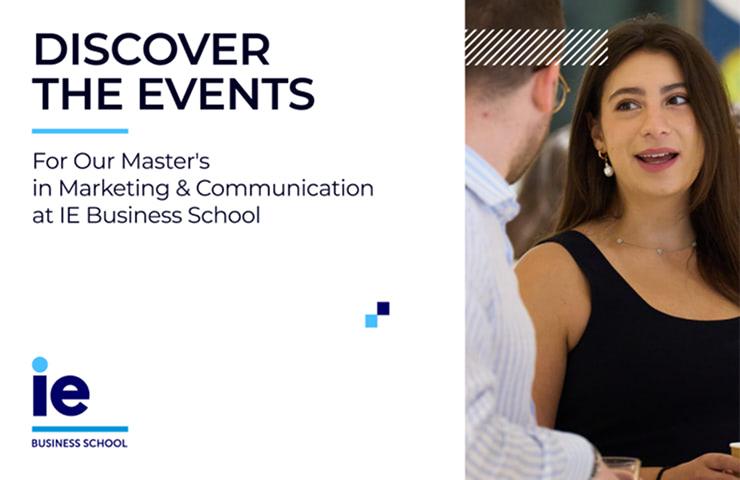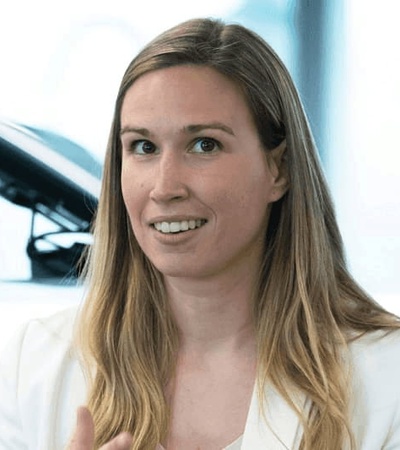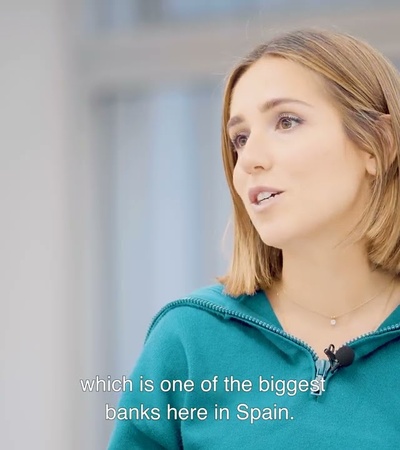
Master in Strategic Marketing & Communication
Master in Strategic Marketing & Communication
- Home
- Master In Strategic Marketing & Communication
MULTI-DIMENSIONAL MARKETING AND COMMUNICATION FOR A NEW ERA
MULTI-DIMENSIONAL MARKETING AND COMMUNICATION FOR A NEW ERA
In our advanced digital era, innovative thinkers are needed to design marketing and communication strategies that cut through the fog and engage hyper-connected consumers. The Master in Strategic Marketing & Communication will provide you with the tools, knowledge and experience needed to meet these challenges, allowing you to lead your organization to success in a dynamic and complex business ecosystem. This program is a 360-degree exploration of the current marketing and communication landscape, challenging you to pursue the next best you as you gain skills in brand and reputation management, communication and marketing.
This rigorous program includes several unique components designed to boost your educational experience and help you stand out from the competition:
- Kick-start your learning with the Common Core Period, where you master the basics of analytical, commercial, creative and digital skills while you build connections with your diverse, international classmates from our various programs.
- Complement your skills with optional certifications from digital leaders like Google and Salesforce. We also offer the IE University Sustainability Certificate, which features expertise from the top-ranked IE Business School.
- Gain firsthand experience with our optional international experiences. Join the Global Immersion Week or Social Impact Week and visit leading players in the field in London, Ghana, Amsterdam or South Africa.
- Build your professional skills with an Optional Career Track after finishing your program. This is a three-month add-on that allows you to gain practical experience in specific industries.
*The 2026–2027 intake starts on September 7th.

WANT TO KNOW MORE?
YOUR PROGRAM, PART OF THE STAGE EXPERIENCE
YOUR PROGRAM, PART OF THE STAGE EXPERIENCE
By studying a program in Marketing, Branding & Sales, you’ll be a part of something bigger than just your studies, something we call The Stage. All programs will benefit from The Stage experience, which includes a Common Core Period with fundamental courses and optional program ad-ons such as: certifications, international experiences, career sector track extension. The Stage ensures that you not only create lifetime friendships and professional networks but will also have a well-rounded education that prepares you for the next stage: a successful career after graduation.
BOOK A CALL WITH ME
CHAT WITH ME
ABOUT THE PROGRAM
WHO IS THE MASTER IN STRATEGIC MARKETING & COMMUNICATION FOR?
WHO IS THE MASTER IN STRATEGIC MARKETING & COMMUNICATION FOR?
IT'S FOR INDIVIDUALS WHO...
...are future-thinking professionals with a strategic business mindset in the marketing and communications field.
ARE LOOKING FOR...
…a 360-degree vision of communication and marketing. The program prepares professionals to lead and guide their organizations through strategic decisions, with agile methodologies and application of the latest trends, creating business value through branding, communication, marketing and reputation management. Students may go on to roles such as brand manager, crisis communication and reputation manager, communication director, CSR and social impact manager, new media strategist, risk and crisis manager and more.
Rankings
Rankings
- 5globallyMaster in Strategic Marketing & CommunicationQS Master's in Marketing
KEY AREAS OF THE MASTER IN STRATEGIC MARKETING & COMMUNICATION
KEY AREAS OF THE MASTER IN STRATEGIC MARKETING & COMMUNICATION
COMMON CORE PERIOD
CORPORATE BUSINESS & MANAGEMENT
STRATEGIC COMMUNICATION AND MARKETING
COMMUNICATION AND MARKETING PLANS
REASONS TO STUDY THE MASTER IN STRATEGIC MARKETING & COMMUNICATION
REASONS TO STUDY THE MASTER IN STRATEGIC MARKETING & COMMUNICATION
IE University molds students into future-forward and well-rounded professionals, using methodologies that put innovation and employability at the forefront.
- 01.
A DEEP DIVE INTO COMMUNICATION IN THE DIGITAL ERA
Earn the latest skills and knowledge to develop, from A to Z, not only communication and marketing plans but also contingency, issue management, brand management, CSR and reputation plans.
- 02.
LEARN FROM TOP PROFESSIONALS OF THE NEW DIGITAL ECONOMY
Our faculty is made up of a diverse group of academics and professionals, who bring pedagogical rigor and real-world expertise into the classroom.
- 03.
UNLOCK YOUR HIGH-IMPACT CAREER
Companies need modern professionals to lead and guide their organizations through agile methodologies and the application of the latest trends in creating business value through branding and reputation management.
- 04.
MAKE THE RIGHT CONNECTIONS
Gain access to IE University’s unparalleled network of 60,000 professionals worldwide and a careers department focused on helping you build relationships that matter.
YOUR FUTURE NETWORK
STUDENT PROFILE
STUDENT PROFILE
by Academic Background (%)
LegalEngineeringSocial SciencesScienceHumanitiesOthersBusinessby Region (%)
Latin AmericaNorth AmericaAsia PacificEuropeby Industry (%)
Marketing /Media/ TechnologyConsumer Products & RetailEducation & NGOTourism & HospitalityFashion & LuxuryBanking & ConsultingHealthcare / Pharma / BiotechnologyOther
- 40nationalities represented in class
- 80000+IE University Alumni in your network to help you get where you want to go
- 83%International students
HERE ARE SOME POSITIONS OUR STUDENTS CAN ACHIEVE AFTER THE PROGRAM
HERE ARE SOME POSITIONS OUR STUDENTS CAN ACHIEVE AFTER THE PROGRAM
Career Opportunities
View all positions
DISCOVER MORE ABOUT CAREER OPPORTUNITIES WITH THE MASTER IN STRATEGIC MARKETING & COMMUNICATION
DISCOVER MORE ABOUT CAREER OPPORTUNITIES WITH THE MASTER IN STRATEGIC MARKETING & COMMUNICATION
STUDENT EXPERIENCE
Discover the student experience
Discover the student experience
MARI'S EXPERIENCE
“I am working on an integrated communication campaign for BBVA, which is one of the biggest banks here in Spain.”
YOHAN'S EXPERIENCE
“It was very thrilling, very challenging, but gratifying in the end.”
STUDENT SUCCESS STORIES
STUDENT SUCCESS STORIES
At IE Business School, one of our core goals is to blend expert teaching with practical learning, equipping students for real-world success. Our current students in the Master in Strategic Marketing and Communication program are making remarkable strides in their careers, securing prestigious internships and positions at leading global companies.
Learn more about their journeys here:
MARKETING, COMMUNICATION & SALES: WHAT COULD YOUR FUTURE LOOK LIKE?
MARKETING, COMMUNICATION & SALES: WHAT COULD YOUR FUTURE LOOK LIKE?
our faculty
our faculty

OUR MASTER IN STRATEGIC MARKETING & COMMUNICATION ACADEMIC DIRECTOR
OUR MASTER IN STRATEGIC MARKETING & COMMUNICATION ACADEMIC DIRECTOR
Cristina Vicedo Álvarez - Professor in the following masters: Executive Master in Strategic Marketing & Communication, Master in Digital Marketing
- General director of FutureBrand in Madrid
- President of the AeBrand management board
- Representative in communication and branding forums and institutions (Woman's Week Foundation, Dircom)
MAKE IT A DUAL DEGREE - DOUBLE YOUR IMPACT
MAKE IT A DUAL DEGREE - DOUBLE YOUR IMPACT
Pursue two disciplines while gaining insight from different perspectives and ways of thinking. You'll cover the contents of two master's programs—and graduate with two diplomas—ensuring in-depth expertise that maximizes your value in the job market.
Experience Madrid
Experience Madrid
Madrid is one of the most popular cities in Europe for Gen Z travelers and one of the most student-friendly cities in Spain, with a great, affordable public transport network, cool underground culture and fabulous nightlife. But Spain’s capital is also home to international companies of stature, including Google, Microsoft and Apple, creating a myriad of opportunities for professional experience.
Madrid is in a league of its own and provides the perfect backdrop for rounding off a unique educational experience.

Discover related programs to the Master in Strategic Marketing and Communication:
Discover related programs to the Master in Strategic Marketing and Communication:

INTERESTED IN STUDYING MARKETING & COMMUNICATION IN NEW YORK?
INTERESTED IN STUDYING MARKETING & COMMUNICATION IN NEW YORK?
Check out the MS in Strategic & Creative Marketing, Communication & Media at our partner institution IENYC. It blends business, marketing strategy, creativity, and marketing-applied technology - designed to prepare a new generation of marketing and communications leaders who can navigate a fast-changing landscape shaped by AI, media convergence, and cultural influence.

THE ULTIMATE GUIDE
THE ULTIMATE GUIDE
Everything you need to know about our Marketing and Communication events
FREQUENTLY ASKED QUESTIONS
FREQUENTLY ASKED QUESTIONS
What makes the Master in Strategic Marketing & Communication different from other marketing master's?
What makes the program stand out is its uniquely holistic approach to the Marketing & Communications discipline. In an age of hyper-connectivity, this program is designed to create the well-rounded professionals currently in demand, who are skilled in the sector's emerging tech as well as enhanced communication, brand and reputation management, and marketing capabilities. Furthermore, optional certifications from sector leaders like Google and Salesforce, firsthand immersion experiences overseas and optional, experiential Career Sector Tracks make this the complete program.
Is the program taught fully in English?
Yes. The Master in Strategic Marketing & Communication is delivered entirely in English.
Who is the ideal candidate for the Master in Strategic Marketing & Communication?
Ideal candidates are professionals with a strategic business mindset. While most of our students come from the marketing & communication industry, it's by no means essential—many others have backgrounds in journalism, law, social sciences, humanities or other areas.
What career outcomes do graduates achieve?
Graduates of the program go on to succeed in a number of industries, securing roles as digital consultants, marketing or brand managers, media buyers, directors of corporate affairs and more.
WHAT DO YOU LEARN IN MARKETING AND COMMUNICATIONS?
Following an initial Common Core Period, in which you’ll study common courses with master’s students from our other Marketing, Communication & Sales programs, you’ll then move on to study a number of areas in more depth: corporate business and management, strategic communication and marketing, communication and marketing plans, and tools and skills for communication and marketing. You’ll then undertake a final project, working in teams to solve a real-world challenge.
DO I NEED A BACKGROUND IN MARKETING OR COMMUNICATION?
The Master in Strategic Marketing & Communication is aimed at professionals with a strategic business mindset in the marketing and communications field. While the majority of our students come from a marketing or communications background, many have backgrounds in law, social sciences, humanities or other areas.
WHAT IS THE STRUCTURE OF THE MASTER IN STRATEGIC MARKETING & COMMUNICATION?
The 1st term lasts three months. During this time you’ll study the core subjects, followed by the specialized subjects. The 2nd term, also lasting three months, builds on the basics learned in term one, tackling more advanced topics surrounding the way corporations communicate their identity, the strategies to best express that brand and the responsibility that corporations have to improve society. In the 3rd term, which lasts four months, you’ll solidify the skills you’ve already learned and dive into discussions, case studies and hands-on simulations to master topics such as internal communication, marketing strategies, public affairs and consulting. This culminates in the final project, where you’ll work on a consulting brief for an existing company.
IS THERE A PART-TIME OR EXECUTIVE VERSION OF THE PROGRAM?
Yes, we also offer a part-time Executive Master in Strategic Marketing & Communication , which lasts 15 months and is delivered in a blended format.
WHAT DOES THE DAY-TO-DAY IN THE PROGRAM LOOK LIKE?
This is an intense full-time program with classes from Monday to Friday in our Maria de Molina Campus. You can expect aproximately 3 or 4 hours of classes per day, which may be scheduled in the morning or the afternoon. In addition, you will also be required to complete individual and team work, for which we recommend spending around 2 hours per day. We don't recommend that you work while you study this program.










